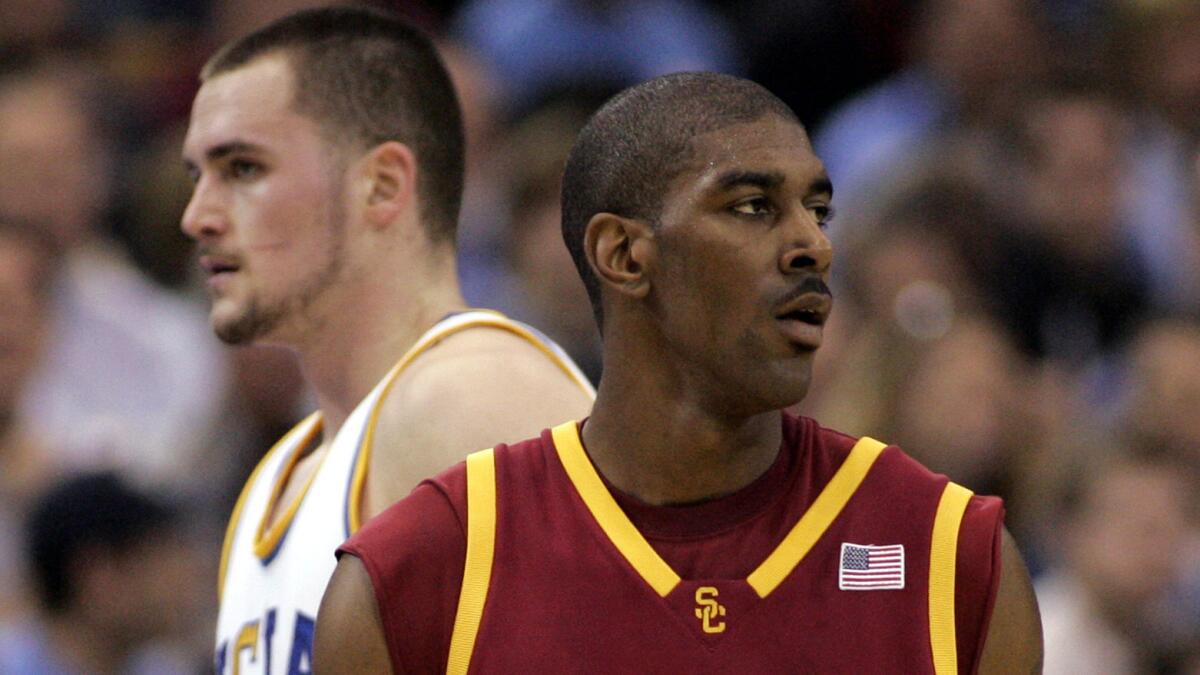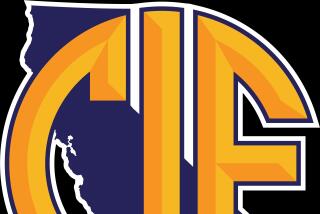Pac-12 Conference proposes sweeping changes for basketball, including the elimination of the one-and-done rule

With the NCAA considering widespread changes to college basketball, the Pac-12 Conference has issued a set of recommendations for overhauling a sport beset by scandal.
In a 50-page report released Tuesday, the conference proposed abolishing the one-and-done age limit and creating an independent enforcement unit to police the game nationwide.
âI think there has been a wakeup call,â Commissioner Larry Scott said. âItâs time for bold reform.â
The Pac-12 is hoping its suggestions will influence a broader commission established by the NCAA in the fall. Though critics of college sports applauded the effort, some wondered whether it went far enough.
âGetting rid of one-and-done is not a panacea,â said Dave Ridpath, an Ohio University associate professor who heads a reform organization called the Drake Group. âPeople like Larry Scott are still holding onto a model that is ultimately going to fail.â
The report was triggered by an ongoing federal investigation that has alleged widespread cheating with coaches, agents and others funneling cash to players and recruits.
So far, 10 people have been charged in federal court, including former USC associate head coach Tony Bland and former assistants at Arizona, Auburn and Oklahoma State.
The Pac-12 formed its task force in October, enlisting UCLA athletic director Dan Guerrero; former coaches Steve Lavin and Mike Montgomery; and former athletes Jennifer Azzi, Charles Davis and Brevin Knight, among others.
The group met for nearly five months before issuing its recommendations.
Of primary concern was the one-and-done issue, which refers to an NBA rule that since 2005 has prohibited players from entering the league until they are 19 and one year after their high school class graduates.
Athletes forced to spend a season in college are considered more likely to take money from agents and boosters. The Pac-12 wants the NBA to accept players straight from high school but wait at least three years for those who choose to enroll in college first.
Furthermore, an athlete who enters the NBA draft but does not sign a professional contract would retain his college eligibility.
Though the NBA and its players union have been reluctant to rescind the age limit, Scott believes the scandal has changed some minds.
âThereâs a lot of damage being done to the NBA and their next-generation stars,â Scott said. âThe NBA needs to be a big part of the solution.â
The creation of an independent enforcement unit â paid for by television contracts, corporate sponsorships and other revenues â would remove the onus from NCAA investigators who are seen as over-burdened and largely ineffective.
Rules covering minor violations, such as schools occasionally paying for meals or family travel, would be relaxed, with an emphasis placed on major infractions.
The Pac-12 task force also called for altering the gameâs relationship with shoe and apparel companies.
Schools and coaches would have to disclose the terms of all contracts with such companies. Assessment of recruits would shift from tournaments ran by shoe companies to combine events co-sponsored by the NCAA.
In a suggestion that might be viewed as more controversial, high school athletes from sophomore class onward would be allowed to seek professional guidance from agents.
âNow is the time to step up and make changes to both restore trust in our game and protect the best interest of our student-athletes,â Guerrero said in a statement.
Analysts contend the task force has ignored a basic inequity whereby young athletes who help generate billions of dollars for college sports are receiving scholarships and stipends that pale in comparison to their true market value.
âThatâs really the elephant in the room,â said Mark Conrad, director of the sports business program at Fordham University. âWhat kind of compensation should student-athletes receive?â
The task forceâs narrower focus was unanimously approved by Pac-12 presidents and chancellors at the conference basketball tournament last weekend.
The report has been forwarded to the NCAA commission, headed by former Secretary of State Condoleezza Rice, which is expected to deliver its own report soon.
âI am confident these recommendations will receive wide support,â Scott said. âAnd we look forward to working the NCAA and our colleagues across all sports to make these ideas a reality.â
More to Read
Go beyond the scoreboard
Get the latest on L.A.'s teams in the daily Sports Report newsletter.
You may occasionally receive promotional content from the Los Angeles Times.











